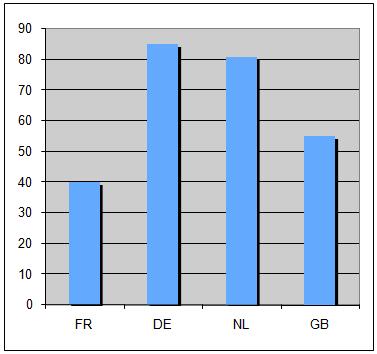Why Central Europe?
 “What is unusual about Eastern and Central Europe is that their most advanced cities offer a potent mix of attributes that even Bangalore cannot rival: a highly educated, multilingual pool of talent in an increasingly affluent consumer market — all barely a stone’s throw from its prime clients”
“What is unusual about Eastern and Central Europe is that their most advanced cities offer a potent mix of attributes that even Bangalore cannot rival: a highly educated, multilingual pool of talent in an increasingly affluent consumer market — all barely a stone’s throw from its prime clients”
1. Cost savings, low wage inflation
2. Proximity = Accessibility
3. Skilled, multi-lingual resources
4. Culturally aligned to the west
5. Existing Infrastructure
1. Lack of infrastructure
2. Rising labour costs
3. Proximity
4. High attrition rate
5. Political instability
Labour shortage with 1+ billion population?
As strange as it might seem, that’s exactly what’s facing India right now. Fewer than 8 million of the country’s 200 million students make it through high school, and even fewer finish college.
At the nation’s 1,200 technical colleges, just 400,000 engineers graduate each year, estimates the NASSC. Among those, only a fourth has the skills to immediately start work at a multinational or major Indian IT firm.
Source: Business Week Outsourcing – Hiring Hunt 20 February, 2007
Okay, so you’ve decided outsourcing might be right for you, but where? You read about India in the news every day, and even China.
Sounds exotic and fun but then again, you’ll need a visa, at least 24-hours of travel time, 3 to 5 days out of office and maybe shots and malaria pills. On the other hand, you could be in Bratislava tomorrow morning and back home in time for dinner.
Central Europe, with its low cost labour and infrastructure, proximity and cultural alignment to the west, and educated and innovative pool of professional resources, provides the ideal business environment for nearshore solutions.
Additionally, lower wage inflation rates, lower attrition rates and multi-lingual resources add to the ongoing value of Central Europe.
Top 10 Benefits of Central Europe Nearshore Providers
1. Availability of high quality talent
2. Competitive prices with low wage inflation
3. Proximity to Western Europe
4. Multi-lingual staff
5. Reliable infrastructure already in place
6. Political stability, EU, NATO and WTO
7. Low attrition rate
8. Culturally aligned with the west
9. Classical education in sciences
10. Secure legal framework

% of companies in EU counries citing culture and language as outsourcing obstacles
While India has been the predominant player in outsourcing, Central Europe is quickly becoming the region of choice for Western Europe nearshore services.
In 2006, while Apple announced they were abandoning their India offshore plans due to rising labour costs, high attrition and shortage of skilled labour, Morgan Stanley announced their plan to open a business services and technology centre in Budapest following the successful launch of their mathematical research centre in 2005.
In both cases Morgan Stanley cited “availability of high-quality talent” as the primary driver.
Many companies in Europe perceive language and cultural differences as a hindrance to offshoring activities according to a 2004 Forrester Research survey.
As a result, many companies are turning to Central European providers as an alternative to their offshore counterparts.
Political instability throughout Asia, as well as ongoing quality and human rights issues, add to the concerns of companies looking for a long-term, stable solution for their outsourcing needs.
Countries such as the Slovak Republic are members of the European Union, NATO and the WTO providing a stable base for future expansion.
